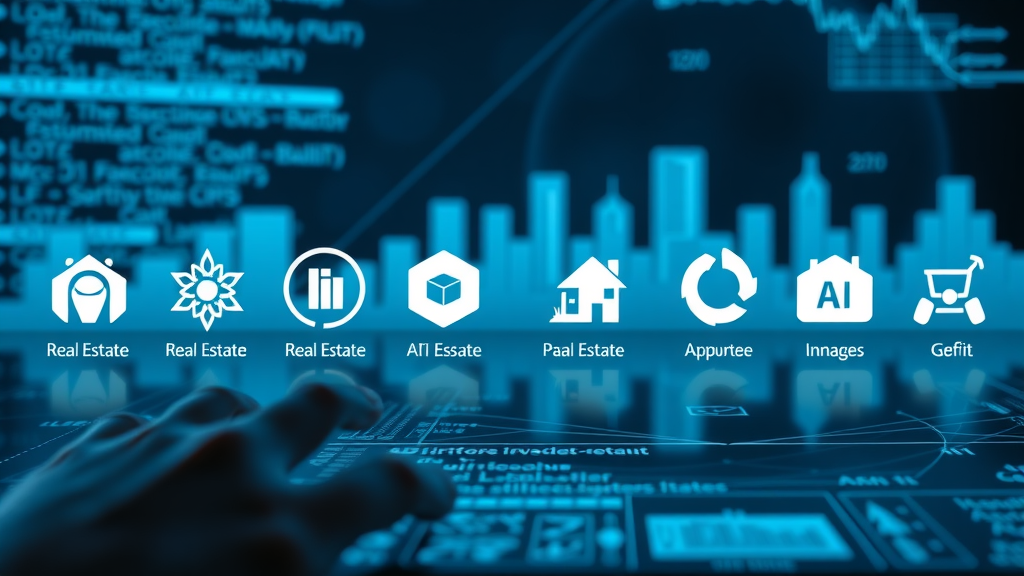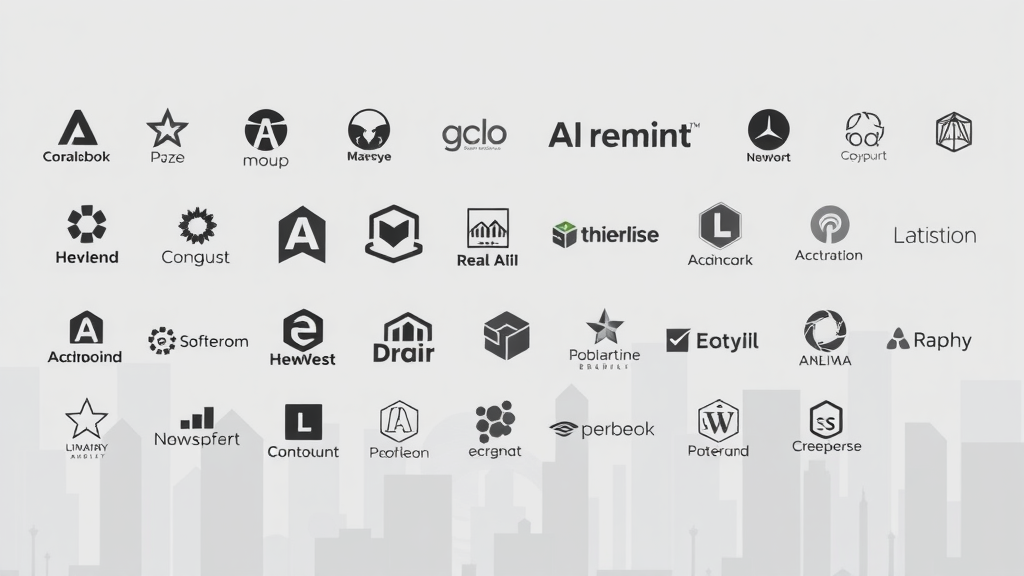Did you know: Over 40% of enterprises are actively seeking lev.ai alternatives in 2024 to future-proof their real estate investments and mitigate operational risks? As the digital wave transforms the financial services sector, knowing your options is no longer just smart—it’s essential. This comprehensive listicle gives you an edge by breaking down top lev.ai alternatives, comparing must-have features, and guiding you through pivotal decisions in the evolving world of real estate artificial intelligence.

Startling Trends: The Rapid Shift Toward lev.ai Alternatives
Within the last year, interest in lev.ai alternatives has surged at an unprecedented rate among major players in the financial services industry. What’s driving this shift? Many real estate professionals and institutional investors are realizing that relying solely on a single AI platform like lev.ai introduces operational risks relating to data privacy, compatibility, and workflow efficiency. Diversifying technology portfolios is quickly becoming the gold standard in real estate and financial technology, as businesses seek out lev alternative solutions that promise improved integration, specialized features, and strategic advantages for scaling growth and minimizing downtime. In fact, recent surveys show that more than 40% of companies in the real estate services sector are making moves to compare lev.ai to similar products to ensure robust, future-ready technological stacks.
"According to recent industry surveys, over 40% of enterprises are seeking lev.ai alternatives to mitigate risk and uncover new efficiencies."
What You’ll Learn About lev.ai Alternatives
- The current landscape of lev.ai alternatives
- Top-rated lev alternative solutions for 2024
- Strengths and weaknesses of key lev alternatives
- How skyline ai and mri software compare to lev.ai
- Essential FAQs about lev.ai alternatives
Table: Quick Comparison of Top lev.ai Alternatives

| Alternative Name | Features | Pricing | Unique Selling Points | User Ratings |
|---|---|---|---|---|
| Skyline AI | Predictive analytics, automated asset valuation, real-time data integration | Custom enterprise pricing | AI-powered investment intelligence, deep learning for market trends | 4.8/5 |
| MRI Software | Property management, accounting, workflow automation | Tiered by modules | Seamless integration, robust support for the financial services sector | 4.6/5 |
| Yardi Voyager | End-to-end portfolio management, compliance tools | Quote upon request | All-in-one scalability, regulatory management | 4.5/5 |
| Dealpath | Deal workflow management, task automation | Subscription-based | Designed for investment teams, customizable workflows | 4.4/5 |
| VTS | Leasing, asset management, analytics dashboard | Contact for pricing | Tenant engagement, commercial focus | 4.7/5 |
| Buildium | Residential management, accounting, communication tools | Starting $50/mo | Great for small agencies, intuitive interface | 4.3/5 |
| RealPage | Multifamily property management, data analytics | Varies by portfolio | Strong data capabilities, real-time reporting | 4.4/5 |
1. Skyline AI: A Leading lev.ai Alternative
Skyline AI’s Unique Offerings Among lev.ai Alternatives

Skyline AI stands as a powerful lev alternative in the real estate technology space, gaining traction among institutional investors and asset managers looking for intelligent automation and advanced predictive analytics. Driven by deep learning and robust data science, Skyline AI offers a holistic solution for market research, automated asset valuation, and portfolio optimization. Its platform integrates real-time data streams, financial modeling, and tailored insights for the financial services sector, giving users significant leverage over traditional market analysis and other similar products. Unlike some competitors, Skyline AI’s machine learning algorithms mine and adapt to a vast ecosystem of real estate data, uncovering trends long before they become obvious.
One major advantage of Skyline AI is its focus on investment intelligence. The company offers a customizable dashboard that analyzes transactions, tenant behavior, and local economic data, translating into more accurate risk assessments and smarter capital deployment. For businesses in the financial services industry or those based in New York and other real estate hubs, Skyline AI’s cutting-edge data approach helps teams stay agile, competitive, and informed in a dynamic landscape. This adaptability places Skyline AI among the top lev alternatives for organizations seeking both power and flexibility within AI-driven solutions.
Pros and Cons: How skyline ai Stacks Against lev.ai
When weighing Skyline AI as a lev alternative, several strengths come to light—starting with its predictive modeling accuracy, ease of integration, and ability to distill actionable insights from complex market signals. Skyline AI’s proprietary AI models give users a competitive edge, supporting smarter investment decisions through automation and rigorous analysis. Another benefit is the platform’s modular architecture, which allows seamless scaling and tailoring for the varied needs of different investment portfolios in the real estate and financial sectors.
However, like any alternative to lev.ai, Skyline AI has areas where it may not be the perfect fit. For smaller agencies or those without a deep technical background, the platform’s advanced toolsets could pose a learning curve. Custom enterprise pricing may also limit accessibility for companies on a tight budget. User reviews indicate that while customer support is responsive, onboarding is most successful when paired with strong internal training. Comparing Skyline AI to similar products, it’s clear the platform excels in automation and analytics—but organizations must evaluate if its level of sophistication matches their operational needs and resources.
2. MRI Software: A Robust Alternative to lev
mri software vs lev.ai: Core Feature Comparisons

Another major name among lev.ai alternatives is MRI Software, a platform known for its robust property management and accounting strengths. MRI Software is particularly favored by enterprises seeking wide-ranging functionality across their real estate assets—covering everything from leasing and contract management to integrated workflows and advanced analytics. One of its strongest draws is seamless integration with legacy systems and a broad library of third-party applications, making it an adaptable choice for organizations entrenched in the financial services sector or navigating complicated site architectures.
Comparing MRI Software to lev.ai directly, MRI excels in customization and depth of financial tooling. Its user-friendly dashboard streamlines operations for property managers while advanced reporting empowers investors across the financial services industry to analyze ROI with precision. Unlike some alternatives to lev that focus solely on new AI features, MRI offers a blend of traditional reliability and modern innovation—allowing organizations to migrate or operate in hybrid digital environments with minimal friction.
When Is mri software a Better lev.alternative?
For some real estate teams and investment firms, MRI Software is the clear lev alternative of choice—particularly when complex property portfolios, compliance requirements, and deep reporting are paramount. The platform shines for midsize-to-large enterprises that prioritize customization, compliance (with features tailored for the financial and services industries), and integration with both new tech and established legacy workflows. User reviews frequently highlight MRI’s scalable architecture and experienced support team, making onboarding less daunting compared to more niche or startup-oriented lev alternatives.
However, companies seeking light, AI-driven automation may find Skyline AI or similar products a better fit for rapid deployment and innovation-centric environments. MRI Software, with its roots in long-standing real estate and financial services, enables deeper control over operations but may require a higher investment of time and internal resources. Ultimately, evaluating MRI Software against competitors like lev.ai and Skyline AI comes down to core business needs, sector focus, and the level of hands-on management preferred by your organization.
3. Other Notable lev.ai Alternatives
- Yardi Voyager
- Dealpath
- VTS
- Buildium
- RealPage

Similar Products: Exploring Alternatives to lev
The real estate technology landscape is brimming with similar products that serve as alternatives to lev, each bringing unique strengths to the table. Platforms like Yardi Voyager deliver full-spectrum portfolio management that’s ideal for organizations needing compliance tools and scalable operations. Dealpath stands out with workflow automation engineered specifically for investment teams, making it a top competitor for deal-centric firms. VTS brings a commercial flair, with dynamic features for tenant engagement and asset management. Buildium excels in residential management, offering user-friendly collaboration tools for small agencies, while RealPage emphasizes data analytics and multifamily property management, making it a standout for larger portfolios in the financial services industry. Examining these similar products ensures your business doesn’t limit itself to a single solution, allowing for greater flexibility and innovation.
Lev Alternatives with Unique Features
While each of the above platforms offers compelling capabilities, the best alternatives to lev are those that go beyond standard property management. For example, Yardi Voyager integrates automated compliance—vital for businesses operating within strict regulatory environments or across the financial sector. VTS offers highly visual analytics dashboards, making real-time decision-making intuitive. On the residential side, Buildium’s intuitive user interface helps even the smallest agencies harness powerful management tools. Platforms like RealPage leverage AI-driven data analytics, offering actionable insights that help organizations optimize portfolios and maximize returns. When selecting a lev alternative, focus on platforms that deliver unique technology or specialized modules tailored to your use case—this strategic approach permits us to improve and customize your experience in today’s competitive services sector.
Critical Comparison: lev.ai Alternatives vs Traditional Platforms

How lev.ai Alternatives Address Common Real Estate Tech Pain Points
Traditional real estate platforms often struggle with data silos, manual reporting, and slow turnarounds—a reality that hinders performance in the fast-paced financial technology environment. In contrast, lev.ai alternatives excel at centralizing data, automating tasks, and enabling better interactions between property managers, investors, and tenants. The use of advanced AI brings greater speed and accuracy to asset valuation, risk analysis, and portfolio diversification—key pain points for businesses across the financial services industry. Importantly, leading lev alternatives such as skyline ai, mri software, and others generally use certain cookies to enable advanced features, improve and customize site experiences, and facilitate compliance across various regulatory frameworks. Consenting to these choices also permits companies to optimize privacy policy approaches, making these new platforms a strategic update over legacy systems found in traditional real estate and financial services environments.
The rise of AI-driven property technology platforms doesn’t just mean automation—it translates to operational excellence: faster transaction speeds, deeper reporting capabilities, and a more agile response to market fluctuations. Sites and services leveraging lev.ai alternatives provide a dynamic interface that adapts over time, keeping businesses in the financial services sector not only efficient, but also compliant and future-ready. This evolution marks a fundamental pivot away from the paper-bound, siloed workspaces of the past and towards a more collaborative, data-rich approach.
The Future of lev.ai Alternatives: Key Trends and Predictions
"The rise of lev.ai alternatives marks a pivotal shift toward smarter, data-driven real estate investment platforms."

The next wave in real estate AI isn’t just about replacing lev.ai, but about redefining best practices in the financial services sector. Emerging trends for 2025 and beyond include real-time machine learning, seamless cross-platform integration, and hyper-personalized asset intelligence. We’re seeing investments surge in platforms that offer open APIs and enhanced security—the backbone for organizations navigating the changing privacy policy and compliance landscape. Artificial intelligence continues to evolve; platforms competing with lev.ai increasingly employ adaptive algorithms that learn and improve over time, setting new standards for efficiency and risk management. As user reviews and cbi websites point out, organizations that diversify early and stay alert to new innovation will lead the services sector through this pivotal transformation.
People Also Ask: Who are Lev competitors?
Answer: Lev competitors include skyline ai, mri software, Yardi Voyager, Dealpath, and VTS—each providing distinct advantages in real estate technology.
People Also Ask: What is the alternative to limitless AI?
Answer: Limitless AI alternatives include both skyline ai and mri software, along with tools like Buildium and RealPage, depending on user needs.
People Also Ask: Is there a free alternative to LensGo AI?
Answer: While most lev.ai alternatives offer free trials, few offer a comprehensive free option. Explore open-source real estate AI platforms for zero-cost testing.
People Also Ask: What is lev AI?
Answer: lev AI is an artificial intelligence-driven platform specializing in commercial real estate transaction automation, analysis, and management.
Lists: Top Criteria for Choosing lev.ai Alternatives
- Industry Specialization
- Integration Capabilities
- User Interface and Experience
- Support and Training
- Pricing Transparency
Quotes: Industry Experts on lev.ai Alternatives
"Selecting the right lev alternatives has become a strategic advantage for forward-thinking real estate investors." — Industry Analyst
FAQs: lev.ai Alternatives
-
What are the main benefits of using lev.ai alternatives?
Leveraging lev.ai alternatives can improve AI-driven decision-making, reduce system vulnerabilities, and offer access to specialized tools tailored for commercial or residential real estate—often resulting in streamlined workflows and boosted ROI. -
Are lev.ai alternatives suitable for small agencies?
Yes. Many lev alternatives, like Buildium and Dealpath, feature user-friendly dashboards and scalable pricing options, making them accessible to both small agencies and enterprise-level firms. -
Can lev.ai alternatives improve transaction speed?
Absolutely. Automation of repetitive tasks, instant analytics, and real-time collaboration help reduce bottlenecks, accelerating deal closure and transaction finalization in the financial services sector. -
What integrations are commonly supported?
Popular lev alternatives support integration with major CRM systems, property accounting tools, compliance software, and custom business intelligence dashboards to centralize and streamline data operations.
Key Takeaways: Navigating the lev.ai Alternatives Landscape
- There is growing pressure to diversify beyond lev.ai in real estate tech
- Leading lev.ai alternatives—like skyline ai and mri software—offer unparalleled innovation
- Evaluate alternatives to lev using clearly defined criteria
- Ongoing industry evolution demands vigilance and adaptability
Conclusion: Making the Smart Choice on lev.ai Alternatives
Final Thoughts: Avoid Disaster by Choosing the Right lev.ai Alternative
Choosing the right lev.ai alternative is crucial—prioritize flexible features, integration, user support, and an innovation-driven roadmap to stay ahead in the real estate technology race.
Call to Action: Begin Your lev.ai Journey Today
Follow this link to begin your lev.ai journey: https://iwebatool.net/0107x.php?page=1807&user=seamandan
Watch: 5-Minute Overview of Top lev.ai Alternatives
See how skyline ai, mri software, and lev.ai stack up in a comprehensive comparison video.
 Add Row
Add Row  Add
Add 




Write A Comment